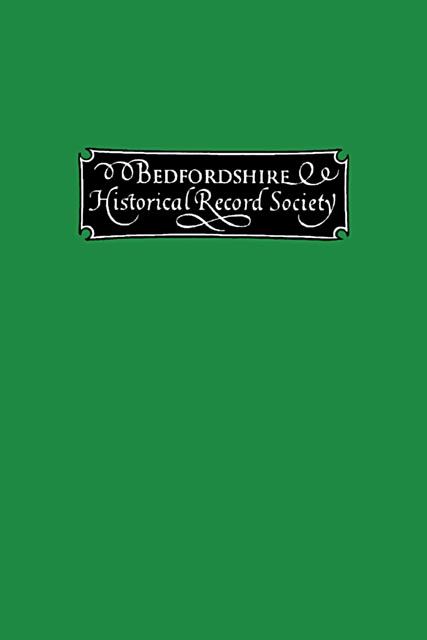Book contents
- Frontmatter
- Contents
- Abbreviations and Symbols
- Stagsden and its Manors
- Three Records of The Alien Priory of Grove And The Manor of Leighton Buzzard
- Ancient Bedfordshire Deeds. III
- Harlington Churchwardens’ Accounts
- Some Bedfordshire Assessments for The Taxation of a Ninth (1297)
- Institutions to Ecclesiastical Benefices in The County of Bedford, 1535-1660
- Notes
- Corrigenda Noticed in The Previous Volumes Published by The Society
- Index
Some Bedfordshire Assessments for The Taxation of a Ninth (1297)
Published online by Cambridge University Press: 18 July 2023
- Frontmatter
- Contents
- Abbreviations and Symbols
- Stagsden and its Manors
- Three Records of The Alien Priory of Grove And The Manor of Leighton Buzzard
- Ancient Bedfordshire Deeds. III
- Harlington Churchwardens’ Accounts
- Some Bedfordshire Assessments for The Taxation of a Ninth (1297)
- Institutions to Ecclesiastical Benefices in The County of Bedford, 1535-1660
- Notes
- Corrigenda Noticed in The Previous Volumes Published by The Society
- Index
Summary
In 1297 Edward I received from Parliament a grant of a ninth to be levied on personal property or movables throughout the kingdom. This form of taxation, the most important source of extraordinary revenue possessed by the Crown during the Middle Ages, very shortly afterwards became a standardized levy fixed in advance for every township, hundred, borough and county; but in 1297 it still retained a spontaneous character which makes such returns as have survived of inestimable interest to the local historian.
The general instructions for the levy of this ninth are very precise. Two chief assessors and collectors, chosen in good faith and after strict enquiry, were to be appointed for each county. They in their turn were to appoint for every vill—according to its size—four or two men of trustworthy character and “substance” (puissantz a respondre de leur feitz en temps avenir), preferably from the vill itself. These men were to take an oath to assess the inhabitants of the vill faithfully, to show no favour “de parente, de favour ou dameste,” that is to say on account of kinship, bias or friendship and to take nothing for themselves save for drinking and eating, “forspis manger e beiver.” They were to enter the results on a roll and send them under their seals to the chief assessors, retaining a copy under the seals of the latter in order to raise the money. The two assessors were to pay domiciliary visits from Hundred to Hundred and from vill to vill to see that the collectors had carried out their duties faithfully; any irregularity discovered was to be reported to the Treasurer and Barons of the Exchequer and a fresh assessment made. When the assessment for the county was complete the original rolls, of which the county assessors would retain transcripts, were to be arranged under Hundreds and sent immediately to the Exchequer. The taxation of the county assessors themselves was to be reserved to the Treasurer and Barons of the Exchequer, while the local assessors were to be taxed by other loyal men of the township appointed by the county assessors. In return for this subsidy the nation received a confirmation of Magna Charta and of the Charter of Forests.
- Type
- Chapter
- Information
- The Publications of the Bedfordshire Historical Record Society , pp. 119 - 132Publisher: Boydell & BrewerFirst published in: 2023



